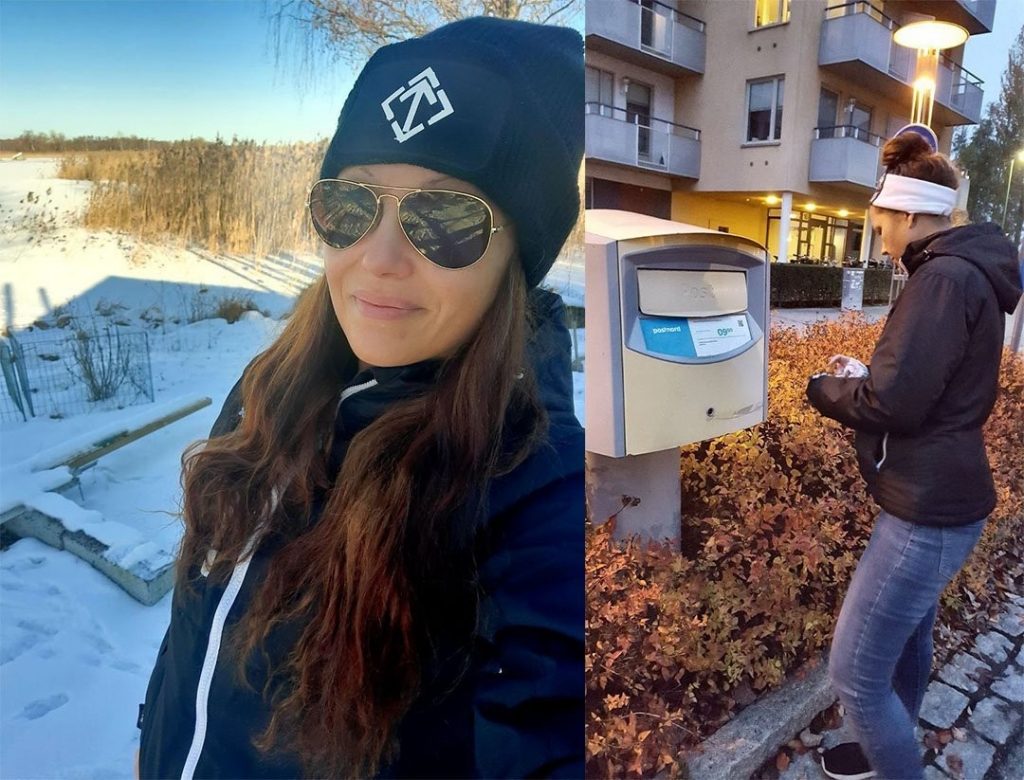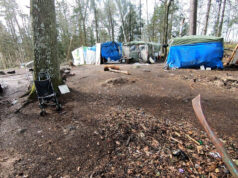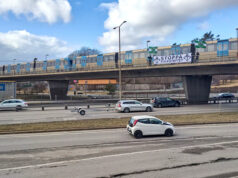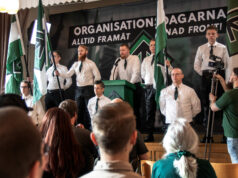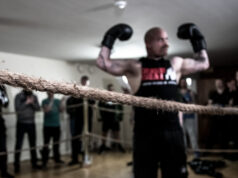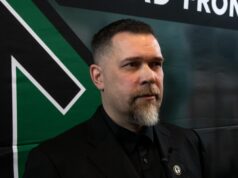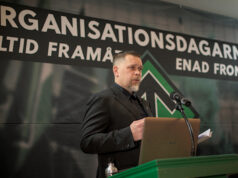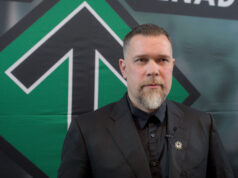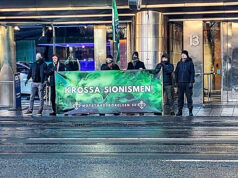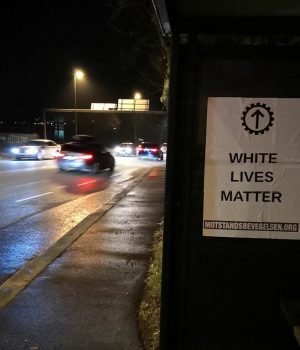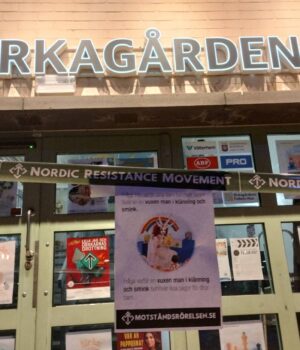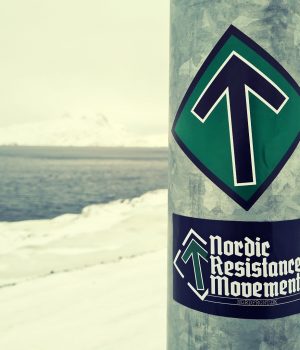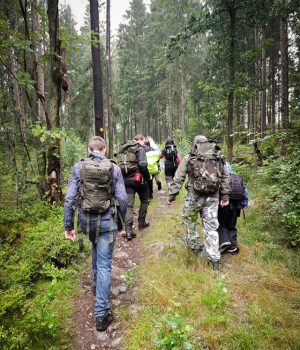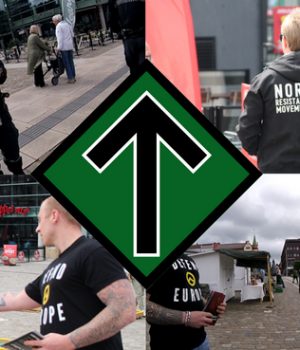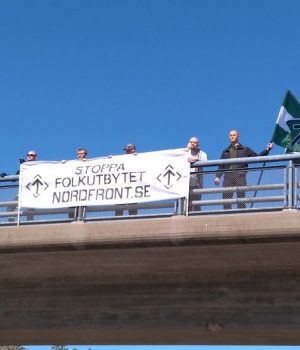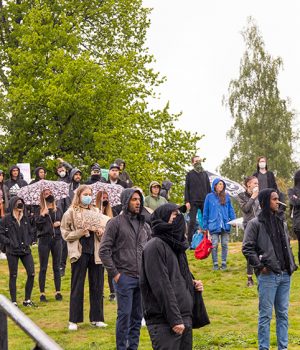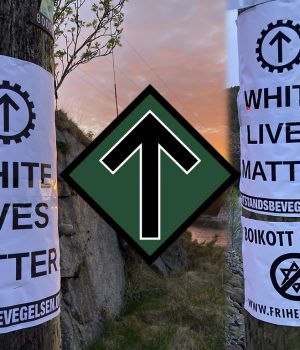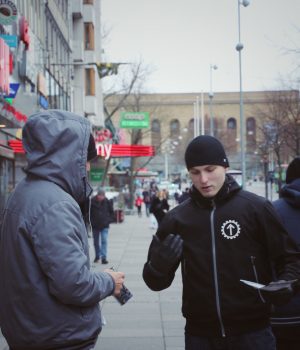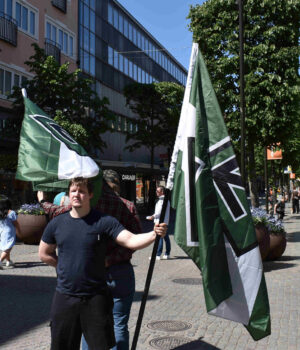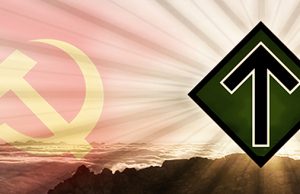INTERVIEW. The Nordic Resistance Movement speaks to Marie – an active female member of the organisation in Sweden’s Nest 8 – about her ideological awakening and work for the struggle.
Marie has been an active member of the Nordic Resistance Movement’s Nest 8 in Sweden since July last year. She is responsible for the Prisoner Help programme in the Nest and is active in the Organiser Group. She participates in public activities and basic activism. In January, she won the Radio Regeringen podcast’s Newcomer of the Year award for 2020.
Would you like to introduce yourself to our readers and tell us a little bit about yourself, your upbringing, family and your awakening?
I grew up in a small town a few miles from Örebro together with my parents and my two big brothers. When I think back to my childhood, I do so with immense warmth. I have always said that I had the best upbringing one could wish for.
When I was twelve years old, I got a horse, and later I went to an agricultural college, so animals and nature have always been close to my heart. I have also always been a truth-seeker. What others are uncomfortable talking about, I become interested in.
My awakening began when I became concerned about people having such hatred and strong opinions, especially about certain leaders – but when I asked these critics about their reasoning, I never got an explanation. They had only read that these people were to be disliked, but could not explain why.
When I began to add myself into the equation, I understood that there were leaders, so-called dictators, which even I had been persuaded to consider evil – without even having any idea why.
That’s when I began doing some research. I started with Muammar Ghaddafi, and as I read, I realised I had been wrong about him because of the way he was portrayed in the mainstream media, so I continued with the next example, which was Saddam Hussein.
Once again I understood how wrong I had been, and that even he fought hard for his people and their well-being.
The more I read, and the more videos I watched, the more I realised that these leaders were loved by the majority of the people in their respective countries – and that the devastating chaos in these countries after their leaders’ deaths was due to the systematic attacks by globalist forces, with a Zionist-led United States at the helm. OK, I might not have expressed myself like that at the time, but the understanding was there.
I finally decided to tackle the worst of the worst, the “icon of evil” himself. And it was via this encounter with this great man and the worldview he represents, which is specially designed for the Germanic peoples – that I understood I had really found my home. I understood that there are few who have done as much for their people as he did.
Furthermore, I could see how the propagandistic and mendacious smear campaign conducted by Zionist forces against both teachers and their teachings in this respect has obviously distorted the consciousness of broad masses of people in the Western world.
The more I studied after my awakening, the more I understood how wrong I had been, not only about this great man, but about leaders, ideologies and conflicts throughout the Western world – and other parts of the globe.
For example, I also read up on Syria’s leader, Bashar al-Assad, and the alleged civil war in his country. Here, too, I understood how misinformed we are. All the leaders I mentioned above have something in common – they are, or were, fighting for their people.
Fairly soon after my awakening, I felt that I could not belong to any other organisation than the one that works and fights for our people and their future, so the Resistance Movement was the obvious choice for me.
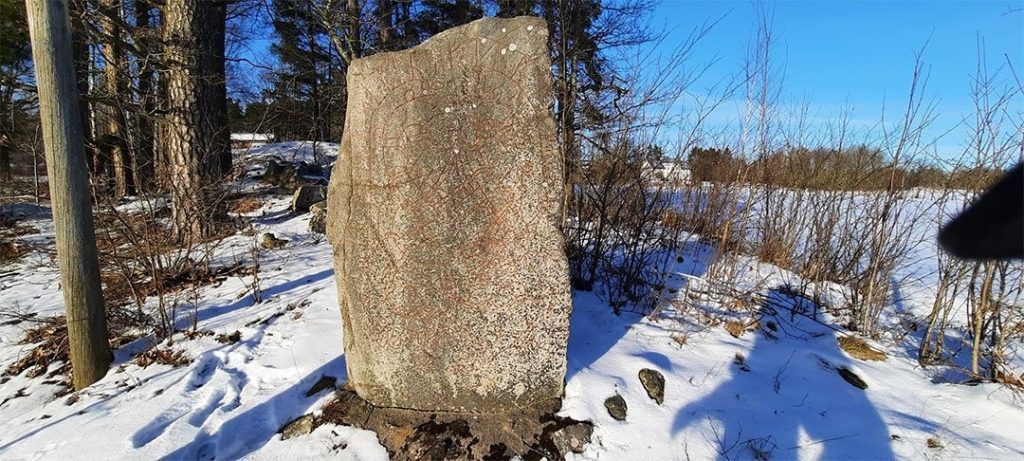
You just answered the next question, but you may want to develop your answer: What made you choose the Nordic Resistance Movement instead of other nationalist organisations?
During my studies into what the world actually looks like, I naturally came across the Nordic Resistance Movement’s website, which is where I found the answers to my questions. The Resistance Movement is the only organisation that consistently takes the side of the Nordic peoples, and which works for the foundation of a free and sovereign Nordic nation overwhelmingly populated by the Nordic peoples. It wasn’t long before I realised that I had found my home. I never really went through any stage characterised by cultural nationalism, Zionism or counter-jihad. I voted for the Sweden Democrats, but that was because I had only just experienced my awakening and didn’t fully understand what they stood for. Since I started reading seriously and associating with nationalists, the Sweden Democrats’ visions of “open Swedishness” and their stance on Zionism and the Jewish state, for example, have never appealed to me.
So you have never been involved in any other organisations?
No.
Are you an active member?
Yes.
If you were to summarise why you are a National Socialist in a few sentences, what would you say?
I would choose the example of a neighbouring country, which, during the 1920s and early 30s, was a country in ruins but which under national and socialist rule flourished to become extremely prosperous within a few years. That is what this ideology/worldview does, regardless of how the mainstream media smears it. Those with an interest in the matter can read about how to lift a country and a people from misery to a state of well-being in just a few years. You can see in photographs and videos how proud and upstanding these people became under this rule; and for me the well-being of the people is something incredibly important, because it is about my future and that of our children. I have not been able to find a similar example in history. This greatly contributed to my experience that National Socialism is the only choice.
Have you felt you’re a welcome and appreciated member in the Nest and Member Group?
I have never before felt so welcomed and at home anywhere than I do now – so YES!
People may have noticed that you and your partner met as comrades in the Nest. What are the pros and cons (if any) of having a partner who shares your life in the struggle?
I can’t see any disadvantages; rather, I think it’s difficult to live with someone who doesn’t share your opinions on something as important as not only our future, but that of our children. So I just see benefits: We think in a similar way, we value the same sort of things and we can help each other – which makes me feel secure.
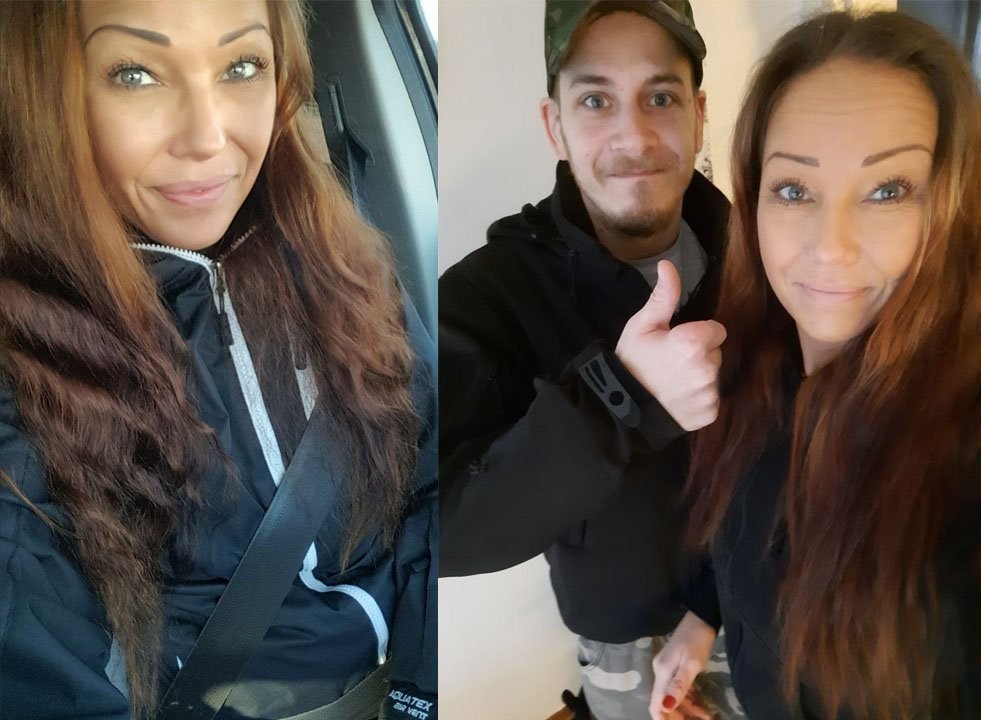
What are the political issues you feel are most important for you to pursue?
The most important issue of all for me is our children’s future.
Do you have any thoughts about how the Nordic Resistance Movement, the Nest and your Member Group have developed since you joined?
That’s difficult to answer. I know it was turbulent for a while before I joined because of the split, but we have a Nest Chief full of ideas and initiative, which means we are constantly evolving as a group.
Which duties do you have within your Member Group and Nest?
I am part of the Organiser Group, I’m responsible for the Nest’s Prisoner Help programme, and I participate in public activities and basic activism according to my abilities.
Have there been any special incidents during your activism or other work in the struggle that you would like to mention?
There was one at my first, actually. It was during some basic activism when we were giving out leaflets and I had to go to the bathroom. On the way back, a very aggressive and threatening man came up to me and started screaming. When he saw the guys I was with a short distance away, he got scared and disappeared in a flash. That says a lot about what some men have become, when they target a lone women but retreat when they see she has a man with her. To me, that’s a very weak man.
Do you feel you have found the kind of activism that fits you best, or are you still finding out as you go?
Yes, I feel I’ve found it, although I am open to change. I do as much as I can with the time outside of work and family life that I have.
There is a large male majority among the activists and members in your Member Group and the whole Nest. What’s it like being a woman in this context?
I feel like one of the gang. But it’s clear that we women are listened to a little more in certain discussions on certain topics, for the very reason that we know that men and women are different.
Is there a female fighter in the organisation who you respect greatly and look up to?
No, I think that all freedom fighters are completely fantastic, regardless of whether they are men or women!
Would you say there is a female fellowship within the Member Group, Nest and Organisation?
I feel a fellowship with both men and women at all those three levels, but it’s clear that in some situations it feels like we women understand one another better, purely because we are women.
How do you think the Nest’s monthly meetings function?
I think they function really well, because they are permeated both by the seriousness of the struggle we wage, and by pure enjoyment and joyful fellowship. Another way of expressing it is that there is a good balance between socialising, formalities and training at our monthly meetings. We have an extremely gifted Nest Chief, who makes sure that I always get to learn something new, and who ensures that it’s always a very nice day that gives me even more energy for our freedom fight!
Do you participate in any study circles in the Nest?
From time to time, but since almost all the material we watch, read and live by here at home is related to the struggle, you could say that we are learning all the time.
Are there any special political “women’s issues” for you – and if so, which ones? Would you say you were engaged in any?
First and foremost, it’s important to get more Nordic women to fight, not just for their own children, but to be able to give all Nordic women’s children (and ultimately all White women’s children) a bright and wonderful future!
It is of the utmost importance that we succeed in awakening a natural but now often dormant racial consciousness in White women. I pursue this issue in all contexts in which I am involved.
What would you say to someone who says, “Women don’t belong in the struggle.”?
Oh! I would be very surprised. I don’t think anyone thinks like that, not in our movement, anyway. Everyone has their place in the struggle, and everyone can do something!
Have you seen any changes in the type of work in the Member Group, the Nest or the entire organisation during the period you have been a member?
I feel that we have become more active in the Nest and have developed an increased creativity in our methods of reaching out to the people.
How does the combination of family life, professional life and activism work for you?
It works well on the whole. But unfortunately I miss some public activities on weekends because of my job.
Do you feel that your political engagement is, or could be, a sensitive issue in relation to your job?
No, I don’t think so. We have quite a lot to do at my job, so there is rarely time to sit down and talk about things that don’t concern it. Besides, I actually have some “awake” colleges I can talk with about most things when there is an opportunity.
It’s been rumoured that you were praised on Radio Regeringen on its 2020 award show after being in the Resistance Movement for just six months. Can you tell us more? What was your reaction when you found out?
Yes, that was unexpected, but naturally I was really happy! We listened to the episode, and I was awarded the prize in the Newcomer of the Year category, which felt really nice. At least I know I’m doing something right!
Putting modesty aside for a moment, why do you think you won the prize?
I don’t know. When I can, I’m there for people 100%. Perhaps that was the reasoning?
What kind of work do you think you will be doing for the struggle in five years? And in 10 years?
I don’t know at this point. Like now, my work for the struggle will be adapted to the prevailing societal situation. In an optimistic scenario, we would not have to fight for freedom in five years, but realistically I hope that by then we will have been able to wake up and recruit more people to our struggle for freedom. If we have not succeeded in awaking enough people in 10 years, I think a third world war could break out around that time. That will be when most people will understand that this is exactly what we were fighting against all the time – and that we are not the evil ones, but the opposite.
What do you think about the discussion in parliament to introduce an organisational ban against the Nordic Resistance Movement?
It just proves one of the things we’re fighting against – the lack of freedom of expression in this country. I have always said: “If you’re up to no good and want to keep getting away with it, you will want to silence those who disagree with you.”
What would you say to someone who is interested the work of the Nordic Resistance Movement but is reluctant to get involved?
It makes me sad when people say, “I’m not interested in politics and such things,” when it’s about their own future and that of all our children. Selfishness is the biggest root of all evil in the world.
I have never understood that kind of selfishness and cowardice. I’ve never been the type to sit back and watch when something is not right. I am often told that I should think about myself and what is best for me and my own – but everyone who knows me knows that I think everyone should be happy, and not just me.
Neither have I ever understood how someone can fail to get involved so that all children can have a bright and wonderful future free from evil – and preferably free from war.
As a mother, I do everything for my children, and I want to be able to look them in the eyes when I say, “At least I did everything I could to give you the future you deserve” – and that’s how I think all parents or people who desire the well-being of others should think – regardless of whether it’s about children or adults.
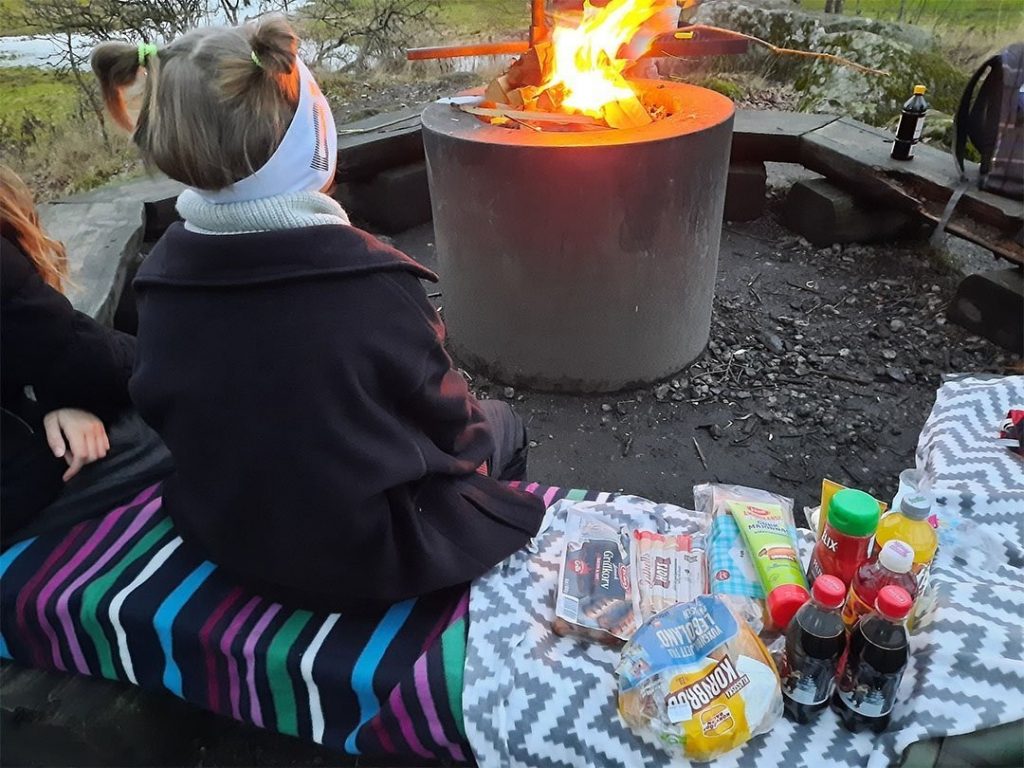
I am certain this is something that exists somewhere within all Nordic people. So my advice is: Let go of your fear, and take the step you know you should take! You won’t regret it.
Thank you for your time and your extensive answers, Marie!
Thanks so much!


